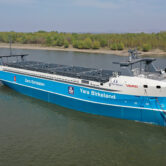SAINT PAUL, Minn. (CN) — One of the last remaining challenges to the controversial Line 3 pipeline was stymied Tuesday when the Minnesota Supreme Court declined to review some of the pipeline’s permits.
Petitioners included two Native American tribes, the Mille Lacs Band of Ojibwe and the Red Lake Band of Chippewa Indians, as well as environmental organizations such as Friends of the Headwaters and Youth Climate Intervenors. The groups sought review of the Minnesota Court of Appeals’ June approval of the Minnesota Public Utilities Commission’s final go-ahead to the now nearly completed pipeline.
Contrary to the appellate court’s 2-1 decision, the groups argued in their petitions, the PUC erred in inadequately considering the impacts of Line 3 on Lake Superior and its watershed when the commission did not require a long-range energy demand forecast for crude oil and when it allegedly failed to consider the impact of greenhouse gas emissions, among other concerns.
Chief Justice Lorie Gildea’s denial of the pipeline opponents’ petitions, issued late Tuesday afternoon, was brief and went into no detail.
Enbridge spokeswoman Juli Kellner wrote in an email that the company was “pleased with today’s decision,” noting that the PUC and Court of Appeals had now reaffirmed their approval for Line 3’s certificate of need, route permit and environmental impact statement on multiple occasions. She also stressed the project’s economic benefits.
“Enbridge has already spent well over $287 million project dollars specifically with tribal nations, citizens, communities, and contractors,” Kellner wrote.
The petitioners thought differently.
“The rights of a Canadian corporation continue to prevail over the laws of nature and the human rights of Anishinaabe people,” said activist Winona LaDuke, whose organization Honor the Earth was also among the petitioners, in a statement. “That a court would rule there is no environmental impact when the rivers have been sucked dry and scientists are declaring a Code Red for the planet is deeply disturbing. A crime is being committed in front of us all. And now Enbridge is set to make a profit off the destruction of our north.”
The decision is not quite a nail in the coffin for anti-pipeline advocates seeking to halt Line 3’s ongoing construction across northern Minnesota, but the order represents a setback in one of just a few remaining challenges to the pipeline’s permitting. The Court of Appeals heard oral arguments in June for a challenge of the Minnesota Pollution Control Agency’s certification of the project under the Clean Water Act; no decision has yet been issued in that case.
Another set of unusual cases are currently playing out in federal and tribal courts.
The White Earth Band of Ojibwe and several of its members recently joined lead plaintiff Manoomin — the name for wild rice in the Anishinaabe language, spoken by tribes variously known as Anishinaabe, Ojibwe and Chippewa — in suing the Minnesota Department of Natural Resources in a tribal court. They alleged that the DNR’s approval of Line 3 permits threatened the rice in violation of treaty rights. The DNR responded last week by filing its own suit in federal court, seeking to enjoin the tribal-court suit from proceeding.
With pipeline construction ongoing, some activists have taken more direct approaches to opposing the project. Protests have dogged the pipeline’s construction sites since construction began in December of 2020, and police have made over 600 arrests and citations in connection with those protests. LaDuke is among those who have been arrested.
Protest tactics have ranged from chants and dances to blocking the entrance to work sites and chaining protesters to equipment.
Line 3 is over 90% complete, according to Enbridge, and the Canadian company estimates that it will be in service transporting crude oil 340 miles from Edmonton, in Alberta, Canada, to the city of Superior in Wisconsin by the fourth quarter of the fiscal year. It would replace an existing pipeline built in the 1960s which became infamous for leaks and spills, including two largest inland oil spills in American history in 1973 and 1991.
Enbridge eventually reduced the pipeline's capacity to 390,000 barrels a day in an effort to reduce spills, and proposed the replacement project in 2014. The new pipeline, the company hopes, will restore and improve upon the original’s peak capacity of 760,000 barrels per day.
Kellner said the replacement would be “safety and maintenance driven,” and thicker steel and new coatings would help “to protect Minnesota’s environment for generations to come.”
Representatives for the PUC said the commission had no comment on the decision.
Subscribe to Closing Arguments
Sign up for new weekly newsletter Closing Arguments to get the latest about ongoing trials, major litigation and hot cases and rulings in courthouses around the U.S. and the world.









